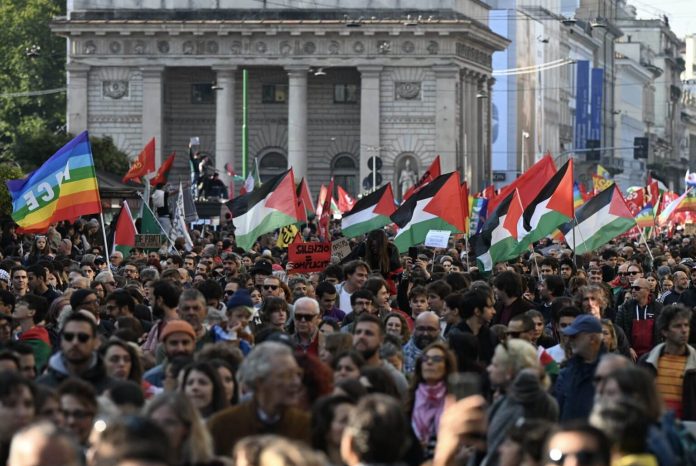– Mohammed Talha Siddi Bapa
On Friday, the waves of the Mediterranean carried two different stories of defiance and power. One unfolded on the high seas, where Israeli commandos stormed the Sumud Flotilla and arrested its crew. The other erupted on land, across Italy, where trains halted, ports closed, and tens of thousands of ordinary citizens filled the streets in protest. Together, they told a tale of global conscience awakening against the war in Gaza.
A Ship Stopped, A Conscience Stirred
The Sumud Flotilla was no warship. It carried no missiles, no troops, no military cargo. Its only weapons were sacks of flour, cartons of medicine, and a banner declaring solidarity with Gaza’s starving population. Onboard were activists, lawyers, parliamentarians, and human rights workers from more than 40 countries.
But for Israel, this was a threat. As the flotilla approached Gaza’s waters, Israeli naval forces surrounded the boats. One by one, the vessels were boarded, their crews arrested, and their cargo seized. Reuters reports that nearly all the boats of the Global Sumud Flotilla were intercepted, leading to the detention of over 450 activists. The final boat, the Marinette, was intercepted and redirected to Israel.
Among those detained were nationals and parliamentarians from Italy. Italy’s Foreign Minister said that four Italian lawmakers had already been deported. Israel justified the operation by calling it necessary to uphold security, claiming the flotilla was violating a lawful blockade and entering a combat zone.
Activists, by contrast, called the interception illegal and decried the blockade as inhumane. Greta Thunberg, among those detained, released a statement calling her capture “unlawful.” The flotilla organisers had argued that Israel’s blockade made conventional humanitarian routes impossible.
Yet the arrest of Italian citizens and the blocking of humanitarian aid triggered something unexpected back in Italy. What happened at sea reverberated onshore – shaking one of Europe’s largest nations to a standstill.
Italy on Strike for Gaza
On October 3rd, Italy witnessed a rare event: a nationwide general strike not for wages or pensions, but for Gaza. Trade unions, students, and civil society groups coordinated the action. Demonstrations took place in more than 100 cities, with significant gatherings in Rome, Milan, Naples, Turin, and Genoa.
Rail services were disrupted across the country. Ports in Genoa, Naples, and Livorno stood still. In Rome, protesters marched from Piazza Vittorio to Termini station, waving both union and Palestinian flags. The CGIL union described the strike as a stand against genocide and militarisation.
In Milan and Turin, some clashes occurred and acts of vandalism were reported, though the protests remained overwhelmingly peaceful. Some sources estimate more than one million people joined demonstrations across Italy.
The strike disrupted transport, port operations, and infrastructure, although metros in Rome and Milan reportedly continued running. The government claimed parts of the strike were illegal, accusing unions of failing to give the required notice.
A Government Under Pressure
Prime Minister Giorgia Meloni’s government did not welcome this eruption of public anger. Speaking at an EU summit, Meloni dismissed the flotilla strike as a ploy for an extended weekend, saying the actions would not help Palestinians but only inconvenience Italians. She also criticized the flotilla as “dangerous and irresponsible.”
Meanwhile, Foreign Minister Antonio Tajani reaffirmed Italy’s support for Israel’s right to self-defence but stated that Israel’s actions had exceeded those bounds and possibly violated humanitarian law. He emphasised that “Gaza is not Hamas. Palestinians are not Hamas.”
Unions and opposition parties accused Meloni’s government of passivity. Some demanded Rome summon the Israeli ambassador and push for real change, not mere words. Catholic institutions, to their credit, joined the chorus, urging more humanitarian action.
Meloni now finds herself navigating a tightrope: uphold traditional alliances (with Israel, the EU, NATO) while the public and civil society demand a more forceful humanitarian stance.
A Global Wave of Resistance
Italy is not alone. Following the flotilla’s interception, Europe saw protests in cities like Paris, Berlin, Barcelona, and more. Colombia even expelled Israel’s ambassador. From Malaysia to South Africa, solidarity actions grew.
The arrest of the Sumud Flotilla echoes past solidarity campaigns – the anti-apartheid movement, Vietnam War protests, and civil rights activism. But here, the urgency is immediate: Gaza is on the brink of humanitarian collapse.
Children starve, hospitals are overwhelmed, and aid convoys are denied passage. In such conditions, the blockade is not abstract politics; it is life and death.
From Silence to Action?
The Sumud Flotilla may have been stopped at sea, but it has ignited a storm on land. Italy’s strike shows that ordinary people can bring a powerful nation to pause, even if for a day.
But the larger question remains: will such actions move leaders like Netanyahu, who so far has ignored every call for ceasefire and every plea for aid? Or will they remain sparks of conscience that flare brightly yet fail to pierce the walls of power?
History will judge not only those who imposed starvation, but also those who looked away while children in Gaza waited for bread. The strike in Italy proves that millions are no longer willing to look away. The challenge now is to turn outrage into real pressure – pressure strong enough to open the blockade and let hope, not hunger, reach Gaza’s people.




